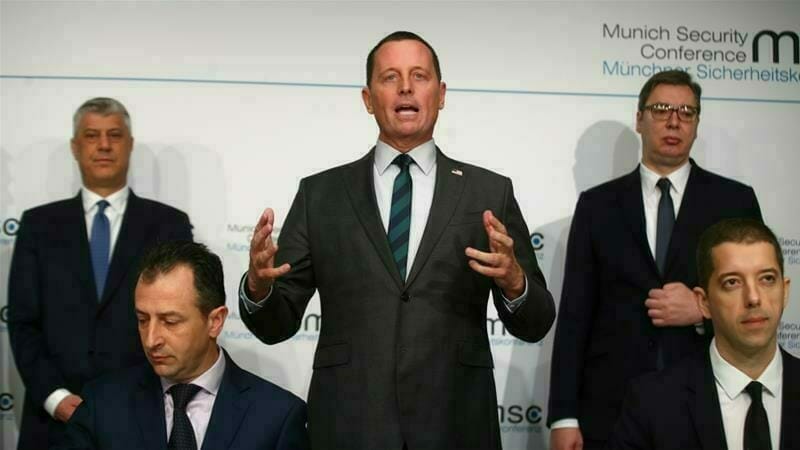Cameron Munter and James O’Brien were guests of the webinar of the Belgrade Fund for Political Excellence (BFPE), where they talked about the upcoming presidential elections in the USA and their impact on the relations between the United States of America (USA) and the Western Balkans. Cameron Munter is a former US ambassador to Serbia (2007-2009) and Pakistan, while James O’Brien, currently vice president of the Albright Stonebridge Group, has dealt directly with the Western Balkans for a long time at the State Department.
Speaking about the foreign policy of the Trump administration, our guests agree that the opening of the North Korean issue, as well as the withdrawal from the Paris climate agreement, will be understood as a break with Obama’s legacy. The United States withdrew from one significant international agreement without offering an alternative, which was an announcement of the times to come.
On Trump’s reaching out to North Korea: “The job of a diplomat is to speak, to always have a question in mind. Should we address those we have not addressed before, such as North Korea? Is it a correct dogma that we should not talk to North Korea at all? These conversations are necessary, but they should make sense and be useful and meaningful”.
Our speakers agree that the former vice president has greater chances in the upcoming elections. Like many, they were surprised by Trump’s 2016 victory: “Immediately after the previous presidential election, I spoke with experts and asked ‘how is this possible?'” Four years later, how Trump approaches governance is clear: “Trump’s briefings are watched by many people, even if they don’t care what he says. However, his voters expected certain great promises to be fulfilled, and they are now disappointed.”
Munter and O’Brien agree that Biden’s great advantage is that his team includes a considerable number of experts; not the case with the administration of President Trump. “The people who advise Biden are experts, who have been in politics for years”. Trump would not get more than 46-47% of the votes, but there is a minimal chance of winning.
With Biden’s victory, we have the opportunity for someone to lead the country in a normal way again, to respect the rule of law, human rights, the rights of its citizens.
When it comes to policy towards Europe and the Western Balkans region, both Munter and O’Brien are optimistic about improving US-EU relations and continuing the “Europeanization and democratization” of the Western Balkans if Biden becomes the new US president, because it depends on improving Euro-Atlantic relations. If, on the other hand, Donald Trump wins the elections again, they expect his anti-European stance to intensify even more, which makes the common approach of the “West” in the Balkans unlikely.
The appearance of Richard Grenell in recent months has attracted everyone’s attention, which has once again put the Western Balkans in the spotlight of the international public. Our speakers believe Grenell works on Trump’s campaign. “His job is not in the State Department, his job is to promote Trump’s campaign as a Special Presidential Envoy for Serbia and Kosovo peace negotiations. In essence, that refers to the relationship between Trump’s domestic and foreign policy and his struggle for popularity and power.”
Democrats, on the other hand, have another problem. If Biden becomes president of the United States, he will have to repair a lot of the damage caused by the previous administration, which certainly includes the policy towards the Western Balkans, with the inclusion of not only new personalities but also the establishment of new institutions. It happened before that the United States acted independently of European allies, but they would return to an approach that focuses on fundamental issues, and that is encouraging the region on the path to European integration.
The key to successfully resolving the problems in the Western Balkans is to refocus, recognize and reconstruct Euro-Atlantic relations.
“If we work more in the Balkans, it will also help improve relations with Europe, that is, Euro-Atlantic relations. So, we will be focused on improving relations with Europe, so the Western Balkans will be an integral part of that.” In addition to political integration between the Western Balkans and Europe, economic integration of the region itself is necessary. “We stand for further democratization of the Western Balkans. I think there will be a greater American presence in the region. There is no exact and concrete date for the final agreement in Brussels and it is unknown whether this sudden rush to solve problems in the Western Balkans is connected to upcoming presidential elections. I think Biden will work to make the whole policy for the Western Balkans more and better coordinated, unlike the current Administration, where there is a great inconsistency of foreign policy.”
The region can be most easily integrated into Europe if it is integrated economically, in the “supply chain” of Europe, because imports and exports in the Western Balkans take too long and cost too much if they take place in a current way, so everyone wants to get closer to Europe by joining that supply chain. The countries that have become richer in the Balkans have become so thanks to the fact that they have become part of the mentioned “supply chain” of Europe. Accordingly, in addition to political reforms and changes, economic changes are needed in the Western Balkans region itself.”
At the very end, the interlocutors touched on the inevitable topic, and that is how the world will look like after the coronary virus pandemic and the role of the United States in the new circumstances. The United States will not be the hegemonic power, but there is no other state who could have it. China, as potentially the biggest competitor of the USA, will have to “sober up from the hangover” caused by the growth in the previous 30 years, while the economy of the European Union will expand, and the EU will remain a great economic power. “We will be there, we will be present, we will be big and strong, it’s just a question of what lessons we learned from COVID-19, from the Trump era, and to focus on that, and not to wait to return to the position of the hegemon.” – concluded our speakers, Cameron Munter and James O’Brien.
Report prepared by Radomir Aleksic, BFPE
Photo: Grenell speaking at Munich signing ceremony, Michael Dalder for Reuters













